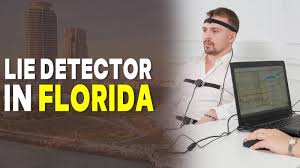Introduction
In the Sunshine State, the topic of lie detector tests—commonly referred to as polygraph exams—remains both intriguing and controversial. Florida, like most jurisdictions, allows the use of polygraphs in certain investigative and employment contexts. Yet, when it comes to legal proceedings, the reliability and scientific standing of these exams have sparked vigorous debate. This article explores what a polygraph test is, how it works, its scientific credibility, how it is regulated at both federal and Florida levels, its admissibility in court, its use in employment situations, particularly in law enforcement, and the precautions individuals should take when encountering one. By understanding these facets, Floridians and others can better navigate the complexities surrounding polygraph tests in Florida.
What Is a Polygraph (Lie Detector) Test?
A polygraph, popularly known as a lie detector test, is a device designed to measure physiological responses—such as blood pressure, heart rate, respiration, and skin conductivity—while the subject answers a series of questions. The underlying theory is that deceptive answers may trigger distinct physiological reactions compared to truthful ones. However, the science is far from settled. The National Academy of Sciences, among others, has concluded that polygraphs show “little basis for extremely high accuracy” and suffer from significant methodological flaws and vulnerability to countermeasures. Even though these machines may detect deception at better-than-chance levels under controlled conditions, they do not reliably distinguish lies from nervousness or other emotional states
Scientific Reliability and Criticism
Despite their dramatic portrayal in films and television, polygraphs are widely regarded in scientific and psychological circles as unreliable. Reviews and academic critiques emphasize that physiological responses measured during a test are not definitive indicators of deception; innocent individuals may exhibit stress responses similar to deceptive individuals, leading to false positives. Moreover, the existence of “countermeasures”—techniques designed to manipulate responses and obscure results—further undermines credibility. Given these limitations, the technology remains more of a psychological trick than a scientifically robust diagnostic tool.
Federal Regulation: The Employee Polygraph Protection Act (EPPA)
At the federal level, polygraph use by employers is regulated by the Employee Polygraph Protection Act (EPPA) of 1988. This law prohibits most private employers from requiring or encouraging employees or job applicants to submit to polygraph testing. Employers who violate this law can face legal consequences. However, there are specific exceptions: employers in certain security-related industries—such as armored car services, alarm and security companies, and manufacturers or distributors of controlled substances—may lawfully use polygraphs under EPPA’s narrowly defined conditions. Government agencies (federal, state, and local) are not subject to EPPA restrictions
Polygraph Regulations and Practices in Florida
Florida does not have a separate state-level licensing or regulation framework specifically for polygraph examiners. Nevertheless, federal legislation like EPPA still applies to private employers operating within the state.
In the realm of law enforcement employment in Florida, polygraph tests are sometimes used as a screening tool during the hiring process. These examinations are generally permitted—but only if the candidate provides informed consent Lie Detector Test.
Victims, suspects, or individuals involved in criminal investigations may also be asked to take polygraph tests. However, consent and proper procedure remain essential—the person must voluntarily agree to the process.
Admissibility of Polygraph Results in Florida Courts
One of the most consequential legal issues surrounding polygraphs is whether their results can be used as evidence in court. In Florida, the answer is consistently no. Courts have long deemed polygraph results inadmissible in both criminal and civil proceedings because their reliability has not been scientifically validated to the standard required for legal evidence Florida case law—such as Davis v. State, Griffin v. State, Farmer v. City of Fort Lauderdale, and Delap v. State—makes it clear that polygraph evidence remains excluded, and it is not even eligible for a Frye-type admissibility hearing. The Supreme Court of Florida reaffirmed that polygraph evidence fails the test of general scientific acceptance and is excluded as a matter of law.
Use of Polygraphs During Investigations
Even though polygraphs are inadmissible in court, they still play a role in police investigations in Florida—but with caveats. Officers may use polygraph results as leverage during questioning. For instance, even if a subject “passes” the test, officers might falsely state that they “failed” in an effort to elicit a confession. Legal advisors strongly recommend consulting an attorney before agreeing to any police-led polygraph test. Subjects under stress may exhibit signs that could mislead the test and its interpretation, and authorities are not obliged to ensure fairness or accuracy.
Rights of Individuals: Consent and Refusal
Florida individuals have the right to refuse a polygraph test. You cannot be compelled to take one unless under specific statutory requirements—such as those related to certain sex offender prosecutions or compliance obligations, which are outside the general criminal context
This refusal, however, may lead law enforcement to increase pressure or suspicion; but legally, you are free to decline, and the refusal cannot itself be used as evidence against you.
Polygraph in Employment Settings (Florida-Specific)
In private employment, Florida is bound by federal EPPA. Most private employers must not demand or even suggest a polygraph. The exceptions still apply—security firms and pharmaceutical entities may request such tests—and only under controlled circumstances.
For law enforcement roles, polygraph tests are a common part of background screenings—but must be preceded by informed consent. Candidates should be aware of their rights and the minimal legal protections governing the accuracy or outcome of such tests
Lie Detector Test Locations
Florida
- Boca Raton – 9856 Clint Moore Road Suite C111-147, Boca Raton, FL
- Fort Lauderdale – 6750 North Andrews Avenue Cypress, Park West, Fort Lauderdale, FL
- Pensacola – 545 Brent Ln, Pensacola, FL
- West Palm Beach – 2054 Vista Parkway Emerald View, #400, West Palm Beach, FL
- Jacksonville – 10752 Deerwood Park Blvd Deerwood, Suite 100, Jacksonville, FL 32256
Practical Advice for Floridians Considering Polygraph Testing
If you’re in Florida and someone asks you to take a polygraph test, consider these steps:
- Understand your legal rights: You are not obligated to agree to a polygraph unless specified by law (e.g., certain registration or compliance situations).
- Seek legal representation: If the request comes from law enforcement, always consult an attorney before consenting.
- Know the limitations: Polygraph results are inherently unreliable and inadmissible in court. Do not view them as definitive proof.
- Be careful with “confessions”: Law enforcement may manipulate polygraph outcomes to extract admissions, even if misleading.
- For job applicants: If your potential employer is in a limited exempted category (e.g., security firms), ensure you’re informed and protected under EPPA.
Conclusion
In Florida, polygraph—or lie detector—tests occupy a contentious space. While they may have investigative utility and are still used in law enforcement recruitment, their scientific validity is questionable, and their results are categorically inadmissible in court. Federal law, via EPPA, restricts their use by most private employers, while law enforcement contexts allow broader but still consent-based application. Floridians should exercise caution, understand their rights, and never treat polygraph results as definitive statements of truth or falsehood.







